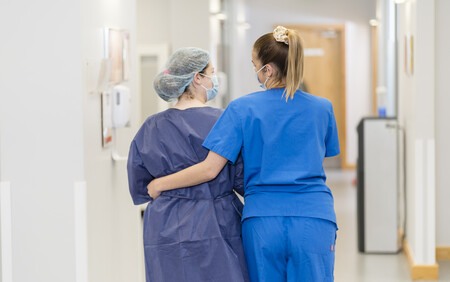
Female Patient Journey
If you’ve been diagnosed with an illness where the treatment could impact your fertility, it’s important to discuss this with your medical team and oncologist to make sure that you preserve your fertility options for the future.
The Sims IVF Fertility Preservation Programme aims to make it as easy as possible for women who have been diagnosed with cancer to have their eggs frozen and preserve their chance to have a baby.
There is often very little time between cancer diagnosis and treatment, so we're prepared to act fast by arranging a fast-track consultation with one of our doctors, so that options can be discussed. Early consultation means that there is time to implement a fertility preservation plan.
We work closely with oncologists and medical staff to ensure that our fertility preservation plan does not adversely affect the timing or effectiveness of your medical treatment.
Viral Status
If not already determined by the referring Oncology Unit, viral status HIV I – II antibody Hepatitis B surface antigen & core antibody, Hepatitis C antibody, Cytomegalovirus antibody (CMV IgG) and other viral agents deemed necessary will be determined, these tests must be undertaken within 90 days of the date of sample collection.
What does egg freezing involve?
There are three general steps involved in an egg freezing cycle.
- Stimulation of the ovaries to encourage development and maturation of the eggs: Under the care of a consultant gynaecologist, the woman is given fertility medications to stimulate her ovaries to produce many follicles. Follicles are the small fluid-filled structures that develop on the ovaries, each of which will hopefully contain an egg. The number and size of the developing follicles are measured by transvaginal ultrasound scans. The exact number of follicles that develop varies between patients, but the average is about 10. The final preparation for egg retrieval involves a hormone injection that mimics the natural trigger for ovulation. Egg retrieval will take place 36-38 hours after this injection.
- Retrieval of the eggs: Egg retrieval is a minor theatre procedure that is carried out on an outpatient basis under local anaesthesia. The transvaginal ultrasound probe is used to visualise the ovaries and a needle attached to the probe is passed through the vaginal wall into the follicles. The fluid within each follicle is aspirated and then examined in the IVF laboratory for the presence of an egg. After identification, the eggs are washed and transferred to Petri dishes in an incubator.
- Freezing of the eggs: The eggs are frozen in the laboratory using a method known as vitrification. The eggs can then be stored until you’re ready to use them when they can be thawed and used for ICSI.
What is vitrification?
Egg freezing is a relatively new procedure because of the complications involved in preserving eggs. The fact that the egg is the largest cell in the body and high in water content makes it difficult to freeze safely. Traditional cryopreservation technology caused crystals to form in the cell, resulting in damage to many eggs, making freezing unviable.
Vitrification is a new cryopreservation technology. It is a flash-freezing process where unfertilised eggs are placed in a special freezing solution, which helps eggs to survive freezing and thawing so that they remain intact and viable.
FAQs
Q. How soon can I get started with fertility treatment?
A. Once your Oncology team completes our referral form and sends to one of our clinics ( Swords – Dublin, Clonskeagh – Dublin, Cork ) , we arrange a consultation with one of our fertility consultants. Our aim is to then arrange for you to attend the clinic to start treatment within 72 hours of this consultation. Sometimes this can be delayed if we are awaiting blood results or adequate clearance from the referring Oncology team.
Q. What types of fertility preservation options are available to me?
A. There are two types of options available, egg freezing and embryo freezing. Egg freezing is when the eggs are harvested at egg collection and all suitable eggs are frozen that same day. Embryo freezing is when the eggs are harvested at egg collection and then fertilised using your partner’s sperm. The embryos are then allowed to grow and develop to a day 5 or 6 embryo and then frozen. Please note that fees apply to any investigations required by the male partner (e.g. Semen analysis, EU viral screens).
Q. What will be involved during my first appointment?
A. At your first in-clinic appointment, you will meet with one of our fertility nurse specialists. The nurse will perform a transvaginal ultrasound and blood tests. The purpose of these investigations is to determine the accessibility of the ovaries for egg collection and determine an appropriate dose of stimulating medication. During the transvaginal ultrasound, the nurse will perform an antral follicle count (AFC). An antral follicle count assesses the ovarian reserve. An antral follicle is a resting follicle which is a small fluid-filled sac containing an immature egg. During fertility treatment, it is these follicles that are stimulated to grow and as they increase in size, the egg grows and matures within them.
Following your ultrasound scan, the nurse will give instructions on the use of each medication and the rationale behind using them. You will be provided with all the information and support required to ensure that you feel comfortable and confident to begin your fertility preservation journey.
Q. How long does the process take and what is involved?
A. The fertility preservation process can take on average about 3-4 weeks to complete. Typically, patients take stimulating medications for 10-12 days before being ready for egg retrieval. You will take injections to stimulate the follicles to grow and therefore mature the eggs within them. You will be monitored by transvaginal ultrasound throughout to assess the growth of the follicles. After starting the medications, you will have your first assessment scan on day 5/6 of the medications and then every 2-3 days until the follicles are deemed ready. The final preparation for egg retrieval involves a hormone injection that mimics the natural trigger for ovulation. Egg retrieval will take place 2 days after this injection.
Q. How is the egg retrieval performed?
A. Egg retrieval is a minor theatre procedure that is carried out on an outpatient basis under conscious sedation, a form of anaesthesia. The transvaginal ultrasound probe is used to visualise the ovaries and a needle attached to the probe is passed through the vaginal wall into the follicles. The fluid within each follicle is aspirated and then examined in the IVF laboratory for the presence of an egg. Typically, you will spend about 2-3 hours in total in the clinic on the morning of the egg collection and will not be able to drive for at least 24 hours after the procedure.
Q. How much will it cost for me to have fertility treatment?
A. There is funding available for women who are publicly referred and approved under the HSE National Oncofertility Preservation Programme. The funding covers blood tests, scans and egg retrieval and the subsequent storageof eggs/embryos for 10 years. Please note that there is an additional charge for male investigations.
The cost of medications is not covered. We advise that you apply for a Drug Payment Scheme card (mydps.ie), which is available to anybody in the ROI with a PPS number. When it comes to the time of buying medications for treatment the price will be capped per month. Without this card, medications are very expensive!
Q. Where should I get my medications?
A. We recommend that you use the pharmacies that we are affiliated with and a list of these will be given to you when you meet with our nursing team.. They are fertility medication experts and have the medication in stock for anything you may need unexpectedly. Pharmacies unfamiliar with fertility medications often do not have medications readily available and we want your treatment to go smoothly.
Q. Can I attend for fertility preservation after I have undergone chemotherapy/cancer treatment?
A. To avail of the National Oncology Fertility Preservation Service, which is publicly funded through the HSE (for those with public hospital referrals), it must be undertaken PRIOR to commencing any cancer treatment.
Q. How do I use my frozen eggs/embryos in the future?
A. If/when you decide to use your eggs/embryos in the future, please contact the clinic to book a consultation with your fertility consultant. Once clearance from your oncology team is received, your consultant will create a plan with you for further fertility treatment.
